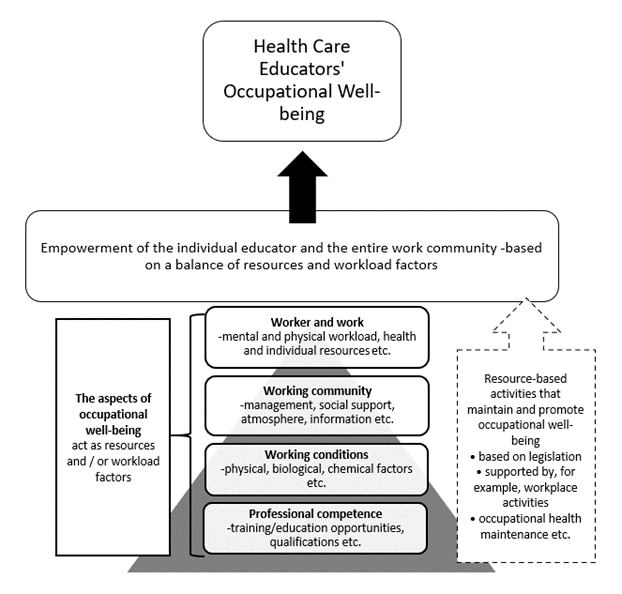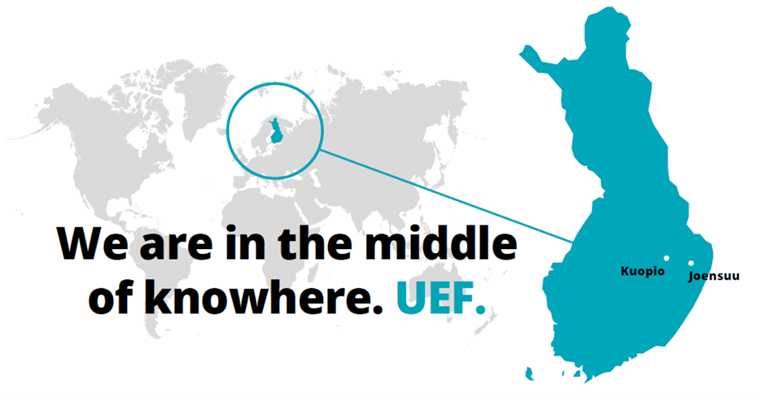It is important to ensure the competence and occupational well-being of health care educators at different career stages, as the high employee turnover caused by the retirement of health care educators will cause a shortage of skilled and proficient workforce. At the same time, the ageing of the population increases the demand for social and health services. While increasing digitalisation at work can be perceived as a work resource, it may also cause burden if employees lack the required skills. The coronavirus pandemic has also challenged educators as it has led to an increase in remote education, and many teachers have been quick to adopt a variety of education technology solutions. Overall, we should pay attention to the fact that the competence and more extensive occupational well-being of health care educators significantly contributes to ensuring the high quality of nursing (Hyvärinen et al. 2018, Saaranen et al. 2020).
Currently, the education for health care educators is highly heterogenous at the European level. High-quality education and training for health care educators promotes rising up to the above challenges that teachers face in their profession. Uniform education in health also fosters better workforce mobility at the international level. The following paragraphs examine the situation of professional competence as part of occupational well-being and reflect on the significance of the project and development activities as a “tool” of change.
Professional competence as part of occupational well-being
The complexity of the concept of occupational well-being poses challenges to developing occupational well-being. The definition of occupational well-being usually includes meaningful work, the working environment, health, safety and well-being, and psychosocial factors (Ministry of Social Affairs and Health 2021). The comprehensive concept of occupational well-being can be divided into four areas: worker and work, working conditions, professional competence and working community. Research has found that each area affects occupational well-being (Saaranen et al. 2020.) Occupational well-being can be considered as a process of empowerment of individuals and their community (Figure 1). Empowering both individuals and communities requires maintaining a balance between employee resources and stress factors in relation to job demands.

Figure 1. Occupational well-being of health care educators as a process of empowerment and related factors (Saaranen et al. 2020).
According to research, there has been an increase in stress factors in the work of educators, reflected as an increase in work-related stress and an experience of finding working hours insufficient for managing all work tasks (Golnick & Ilves 2020, Singh 2020). The work of educators is perceived as physically undemanding but mentally taxing. High stress levels and job burnout have been found to be connected to the quantitative and emotional demands of work (Singh 2020) and reduce job satisfaction and life management (Arian et al. 2018, Singh 2020). These also undermine workforce productivity and commitment, increase sickness absences and shorten careers. As a result, there is need for development activities, but what should these look like and be founded on?
Foundation on a resource-based view – can a project facilitate change?
Resource-based (e.g. Saaranen et al 2020) activities promoting occupational well-being include mostly preventive activities aiming at maintaining work ability. Based on the above division of occupational well-being into four different areas (worker and work, working conditions, professional competence and work community), professional competence plays a key role in this context. A competent employee manages the requirements of work and is better equipped to maintain a balance between resources and stressors. Nevertheless, few studies have concerned the competence of health care educators at the global level. Research in the area has been primarily conducted in Australia, United Kingdom, USA and Finland. In Finland, research in the area has been carried out since the 1990s.
The currently ongoing A New Agenda for Nurse Educator Education Within Europe (New Nurse Educator) is a three-year Erasmus+ funded research and development project. This project aims to take the first steps in harmonizing the nurse educator education within Europe and it is implemented in collaboration between six countries and seven universities: University of Turku and University of Eastern Finland from Finland, Charité – Universitätsmedizin Berlin/Humboldt University from Germany, University of Malta from Malta, The University of Edinburgh from Scotland, Konstantine the Philosopher University in Nitra from Slovakia and Universitat Internacional de Catalunya from Spain. The project involves developing health care educator training with the help of extensive national interview and questionnaire studies and systematic literature reviews using an evidence-based approach. The project also involves producing a 30-credit supplementary training module for health care educators.
We believe that this project can be perceived as a tool for promoting the competence of health care educators and developing more uniform education. The journey itself is as important as its destination. The change requires new ways of thinking and operating, systematic experimentation and continuously learning together – this joint endeavour enables all of us to learn together with our national and international colleagues.
Summer greetings from Terhi, Anneli and Juha
University of Eastern Finland (UEF)
Faculty of Health Sciences
Department of Nursing Science

Picture: University of Eastern Finland

Professor (acting) Terhi Saaranen
UEF Connect https://uefconnect.uef.fi/henkilo/terhi.saaranen/

Project researcher Anneli Vauhkonen
UEF Connect https://uefconnect.uef.fi/henkilo/anneli.vauhkonen/

University Teacher Juha Pajari
UEF Connect https://uefconnect.uef.fi/henkilo/juha.pajari/
References
Arian M, Soleimani M. & Oghazian, M. 2018. Job satisfaction and the factors affecting satisfaction in nurse educators: A systematic review. Journal of Professional Nursing, 34(5), 389–399. https://doi.org/10.1016/j.profnurs.2018.07.004
Golnick T. & Ilves V. 2020. Opetusalan työolobarometri 2020. https://www.oaj.fi/contentassets/14b569b3740b404f99026bc901ec75c7/opetusalan_tyoolobarometri_2020_nettiin.pdf accessed 24.5.2021.
Hyvärinen K, Saaranen T. & Tossavainen K. 2017. Ammatillinen osaaminen työhyvinvoinnin osana – kyselytutkimus terveysalan opettajille. (A teacher’s professional competence as part of occupational wellbeing – A questionnaire survey for Finnish health care teachers.) Hoitotiede (Journal of Nursing Science) 29 (4), 252–263.
Ministry of Social Affairs and Health. 2021. Wellbeing at work. https://stm.fi/en/wellbeing-at-work/data-and-research 25.5.2021.
Saaranen T, Kankkunen P. & Juntunen A. 2020. Terveysalan opettajien työhyvinvointi ja sen edistäminen– työntekijän ja hänen työnsä näkökulma. (The status and promotion of the occupational well-being of health care teachers – the perspective of workers and their work.) Hoitotiede (Journal of Nursing Science) 32(3), 154–165.
Singh C, Cross W, Munro I. & Jackson D. 2020. Occupational stress facing nurse academics—A mixed‐methods systematic review. Journal of Clinical Nursing, 29(5-6), 720–735.
